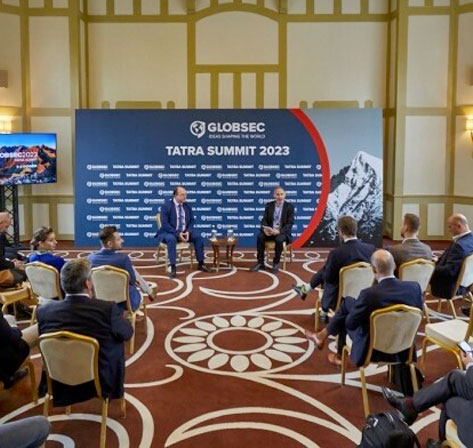October 2023
Moving Beyond Crisis: Creating a More Prosperous and Resilient Europe
Region: Europe
Author: Sally A. Painter & Will Kinsman
Hosted in Slovakia’s Tatra mountains, the forum serves as a key convener for EU policymakers to discuss global issues facing the region and the future of the European Union and of Transatlanticism.
A readout from the 2023 GLOBSEC Tatra Summit
Earlier this month, GLOBSEC, one of Europe’s premier policy organizations, hosted the 10th edition of its flagship Tatra Summit. Hosted in Slovakia’s Tatra mountains, the forum serves as a key convener for EU policymakers to discuss global issues facing the region and the future of the European Union and of Transatlanticism.
Since the Tatra Summit’s first meeting in 2013, geopolitical realities have shifted. Free and fair elections are the norm in the Central and Eastern Europe (CEE) region, not the exception, and many countries in the wider region boast some of the most sophisticated economies within the EU bloc, attracting sizeable investments from around the globe.
Almost 15 years after a group of founding democratic leaders from the region penned an open letter to the Obama Administration expressing concerns over its decision to pivot its foreign policy focus away from the region, global crisis has brought the region’s importance back into focus. In the letter, the leaders warned of key threats to democracy in the region including public skepticism of NATO membership, and U.S. intentions, as well as Russia’s return to imperialism as a “revisionist power pursuing a 19th-century agenda with 21st-century tactics.”
Unfortunately, the letter’s signatories’ predictions have been realized, with the most tangible measure, Russia’s invasion of Ukraine. Having had the foresight to identify these threats, countries in the region are well positioned to identify the solutions needed to address the current crisis.
Being on the frontlines of the Ukraine conflict, the CEE region’s democracies have experienced the impacts of the war in a fundamentally different way than other EU states. Countries in the region have borne much of the brunt of the conflict, providing arms and aid to Ukraine, taking in Ukrainian refugees, and being forced to accelerate their efforts to transition away from fossil fuels to negate Russia’s weaponization of energy exports. All this has been accomplished within the context of a global pandemic and the ebb-and-flow of public support.
While much of the conversation at this year’s Tatra summit focused on the conflict in Ukraine, the summit’s theme, “Forging Economic Growth”, and the topics discussed, which included the CEE region’s role in the EU clean energy transition, defining EU crisis response policy for the future, EU strategic autonomy, as well as digitalization and innovation, signals a much more sophisticated policy dialogue.
Having experience dealing with multiple crises precipitated by an increasingly fractured global status quo, CEE nations are at the forefront of efforts to formulate new solutions and systems to ensure a more prosperous and stable post-Ukraine war global order.
Today, any disillusions that policy leaders in Western Europe and elsewhere in the NATO alliance once might have held about the CEE region’s importance have likely been dispelled. At the same time, these leaders have a growing understanding of the need to consult with regional players to ensure long-term stability and security within the region.
This growing awareness has, by extension, led to an increased recognition of the central role that GLOBSEC has in these necessary conversations. EU and NATO leaders are increasingly participating in GLOBSEC’s events. Recent attendees include French President Emmanuel Macron’s, who gave an address at GLOBSEC’s 2023 Bratislava Forum, and Mathias Cormann, Secretary-General of the OECD, who attended the recent Tatra Summit among many other leaders. This growing recognition demonstrates that GLOBSEC’s role in forging a new future for Europe and beyond will no doubt continue to grow.
